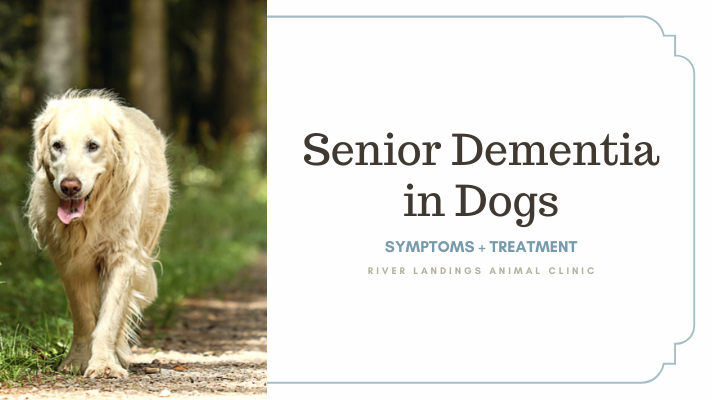Senior dementia is a common problem seen in older dogs just like it is in older humans. Similar to Alzheimer's in people, dementia in dogs often results in altered behaviors and memory loss. These changes may affect the quality of life of both the dogs as well as the dog owners but by better understanding what is really occurring, owners may be able to lessen the negative effects of this issue.
What Is Senior Dementia in Dogs?
Senior dementia is formally known as canine cognitive dysfunction (CCD) but is often also referred to as doggy dementia or doggy Alzheimer's. Dementia isn't a disease but rather a collection of symptoms that result in major changes in mood, behavior, and memory. It usually negatively affects the everyday life of a senior dog and is commonly seen to varying degrees as dogs age. The Behavior Clinic at the University of California states that 28% of dogs aged 11 to 12 years display signs of dementia and that likelihood increases to 68% of dogs when they reach ages 15 or 16.
Leticia Fanucchi, DVM, PhD, director of Veterinary Medicine Behavioral Services at Washington State University's Veterinary Teaching Hospital categorizes CCD into four main types:
Involutive depression: This form is similar to chronic depression in people and results in anxiety.
Dysthymia: This form results in confusion, disorientation, and sometimes a loss of conscious awareness of the body.
Hyper-aggressiveness: This form involves the serotonin, or "happy hormone," levels in the brain and usually results in an aggressive dog.
Confusional syndrome: This form is similar to Alzheimer's in people where a major decline in cognitive function occurs.
Signs
The signs of senior dementia in dogs revolve around the brain changes that occur as a dog ages. These changes may be gradual and worsen as the dog continues to age or they may seem more drastic in nature. Some symptoms also easily go unnoticed until the dog owner is affected by them.
Signs of Senior Dementia in Dogs
Soiling in the house
Getting lost in the house/disorientation
Barking without reason
Going to the wrong side of the door
Lack of interaction with people or other pets
Decrease or lack of appetite
Lower threshold for aggressive behavior
Anxiety
Irregular sleeping patterns
Staring at the walls
Pacing/repetitive behaviors
One of the biggest concerns that dog owners who have dogs with dementia note is the loss of house training. As some dogs develop senior dementia they get confused and may start urinating or defecating in the house. This causes frustration for the owner who may in return get upset with their pet. This affects the human-animal bond and ultimately the quality of life of both the pet and the owner.
Other signs of confusion due to senior dementia include disorientation in the home, staring at walls, and going to the hinged side of a door when the dog has known for years which side of the door opens to go through it. Senior dementia can cause a dog who has known its home environment for years to suddenly get lost in rooms or corners of its house.
Vocalizations, including barking, whining, and crying for no apparent reason, are also often seen in dogs with senior dementia. This may be an indication of stress, fear, or anxiety due to the confusion.
Aggressive behaviors may be more common in dogs with dementia due to their lowered threshold of tolerance and patience. Normally patient and willing dogs may suddenly exhibit signs of aggression such as growling and even biting at people and other pets.
Irregular sleeping patterns, repetitive behaviors such as licking and pacing, a decrease in appetite, and even not wanting to interact with other pets or their owners can be additional signs of senior dementia in dogs. These, along with other behaviors, can all put a strain on the relationships owners have with their dogs.
The most common signs of CCD can be remembered with the commonly used acronym DISHA: disorientation, interaction changes, sleep changes, house soiling, and activity level changes.
Causes
The symptoms are a result of changes or damage in the brain but different symptoms and types of dementia may arise from different brain issues. No one entirely understands the complete causes of dementia. However, there are some things that are known due to the similarities between humans and dogs with dementia. Certain proteins that accumulate in the brain around neurons and the breakdown of neurons are two things that disrupt the normal transmission of information in the brain and therefore contribute to senior dementia in dogs.
Getting a Diagnosis
Your veterinarian will rule out other medical issues with your dog before diagnosing CCD. The Quality of Life Scale (or HHHHHMM Scale) is often used to aid owners in determining whether or not their dog has changed as it ages. This scale goes through the signs of dementia and includes a review of the dog's behaviors. Hurt, Hunger, Hydration, Hygiene, Happiness, Mobility and More good days than bad are assessed in the HHHHHMM scale. This scale also helps an owner decide whether or not a pet's quality of life is still good as dementia progresses and may also help an owner decide when euthanasia should be considered.
Treatment and Prevention
There is, unfortunately, no way to reverse the signs of dementia in dogs but there are some nutritional aids that can be administered to help potentially delay brain changes as a dog ages. Antioxidants, omega-3 fatty acids, and medium-chain triglycerides (MCT's) are the main dietary components that are often discussed for brain health. Some experts recommend supplementing dogs before they begin to show signs of senior dementia but there is no specific treatment or preventative regimen. If you are concerned with CCD developing in your senior dog, talk with your veterinarian about possible preventative measures.
Hear From Us Again
Don't forget to subscribe to our email newsletter for more recipes, articles, and clinic updates delivered straight to your e-mail inbox.
Related Categories:

